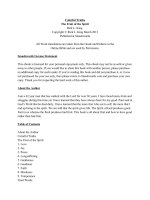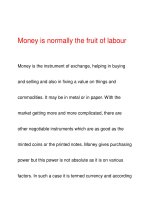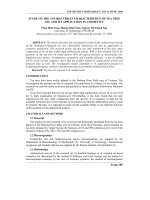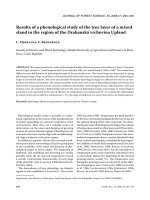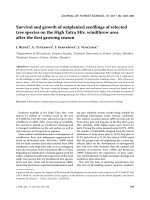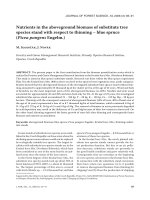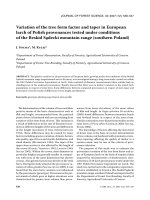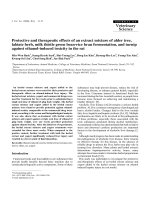The fruit of the tree
Bạn đang xem bản rút gọn của tài liệu. Xem và tải ngay bản đầy đủ của tài liệu tại đây (1.58 MB, 430 trang )
TheProjectGutenbergEBookofTheFruitoftheTree,byEdithWharton
ThiseBookisfortheuseofanyoneanywhereatnocostandwith
almostnorestrictionswhatsoever.Youmaycopyit,giveitawayor
re-useitunderthetermsoftheProjectGutenbergLicenseincluded
withthiseBookoronlineatwww.gutenberg.org
Title:TheFruitoftheTree
Author:EdithWharton
Illustrator:AlonzoKimball
ReleaseDate:September6,2006[EBook#19191]
Language:English
***STARTOFTHISPROJECTGUTENBERGEBOOKTHEFRUITOFTHETREE***
ProducedbyBarbaraTozier,BillTozier,MelissaEr-Raqabi
andtheOnlineDistributedProofreadingTeamat
THEFRUITOFTHETREE
Hestoodbyherinsilence,hiseyesontheinjuredman.
Hestoodbyherinsilence,hiseyesontheinjuredman.
THEFRUITOFTHETREE
BY
EDITHWHARTON
WITHILLUSTRATIONSBYALONZOKIMBALL
NEWYORK
CHARLESSCRIBNER'SSONS
MDCCCCVII
COPYRIGHT,1907,BYCHARLESSCRIBNER'SSONS
mark
ILLUSTRATIONS
Hestoodbyherinsilence,hiseyesontheinjuredman Frontispiece
"No—Ishallhavetoaskyoutotakemywordforit"
Facingp.82
Half-wayuptheslopetheymet
130
THE
FRUITOFTHETREE
I
INthesurgicalwardoftheHopeHospitalatHanaford,anursewasbendingover
ayoungmanwhosebandagedrighthandandarmlaystretchedalongthebed.
His head stirred uneasily, and slipping her arm behind him she effected a
professionalreadjustmentofthepillows."Isthatbetter?"
As she leaned over, he lifted his anxious bewildered eyes, deep-sunk under
ridgesofsuffering."Idon'ts'posethere'sanykindofashowforme,isthere?"he
asked,pointingwithhisfreehand—thestainedseamedhandofthemechanic—
totheinertbundleonthequilt.
Heronlyimmediateanswerwastowipethedampnessfromhisforehead;then
shesaid:"We'lltalkaboutthatto-morrow."
"Whynotnow?"
"BecauseDr.Disbrowcan'ttelltilltheinflammationgoesdown."
"Willitgodownbyto-morrow?"
"Itwillbeginto,ifyoudon'texciteyourselfandkeepupthefever."
"Excitemyself?I—there'sfourof'emathome——"
"Well,thentherearefourreasonsforkeepingquiet,"sherejoined.
Shedidnotuse,inspeaking,thesoothinginflectionofhertrade:sheseemedto
disdaintocajoleortrickthesufferer.Herfullyoungvoicekeptitscoolnoteof
authority,hersympathyrevealingitselfonlyintheexperttouchofherhandsand
theconstantvigilanceofherdarksteadyeyes.Thisvigilancesoftenedtopityas
the patient turned his head away with a groan. His free left hand continued to
travelthesheet,claspingandunclaspingitselfincontortionsoffeverishunrest.
Itwasasthoughalltheanguishofhismutilationfoundexpressioninthatlonely
hand,leftwithoutworkintheworldnowthatitsmatewasuseless.
The nurse felt a touch on her shoulder, and rose to face the matron, a sharpfeaturedwomanwithasoftintonation.
"This is Mr. Amherst, Miss Brent. The assistant manager from the mills. He
wishestoseeDillon."
JohnAmherst'sstepwassingularlynoiseless.Thenurse,sensitivebynatureand
training to all physical characteristics, was struck at once by the contrast
between his alert face and figure and the silent way in which he moved. She
noticed, too, that the same contrast was repeated in the face itself, its spare
energeticoutline,withthehighnoseandcompressedlipsofthemoverofmen,
beingcuriouslymodifiedbytheveiledinwardgazeofthegreyeyesheturnedon
her. It was one of the interests of Justine Brent's crowded yet lonely life to
attempt a rapid mental classification of the persons she met; but the
contradictionsinAmherst'sfacebaffledher,andshemurmuredinwardly"Idon't
know"asshedrewasidetolethimapproachthebed.Hestoodbyherinsilence,
hishandsclaspedbehindhim,hiseyesontheinjuredman,wholaymotionless,
as if sunk in a lethargy. The matron, at the call of another nurse, had minced
awaydowntheward,committingAmherstwithaglancetoMissBrent;andthe
tworemainedalonebythebed.
After a pause, Amherst moved toward the window beyond the empty cot
adjoining Dillon's. One of the white screens used to isolate dying patients had
beenplacedagainstthiscot,whichwasthelastatthatendoftheward,andthe
spacebeyondformedasecludedcorner,whereafewwordscouldbeexchanged
outofreachoftheeyesintheotherbeds.
"Isheasleep?"Amherstasked,asMissBrentjoinedhim.
MissBrentglancedathimagain.Hisvoicebetokenednotmerelyeducation,but
something different and deeper—the familiar habit of gentle speech; and his
shabbyclothes—carefullybrushed,butill-cutandwornalongtheseams—saton
himeasily,andwiththesamedifference.
"The morphine has made him drowsy," she answered. "The wounds were
dressedaboutanhourago,andthedoctorgavehimahypodermic."
"Thewounds—howmanyarethere?"
"Besidesthehand,hisarmisbadlytornuptotheelbow."
Amherstlistenedwithbentheadandfrowningbrow.
"Whatdoyouthinkofthecase?"
Shehesitated."Dr.Disbrowhasn'tsaid——"
"And it's not your business to?" He smiled slightly. "I know hospital etiquette.
ButIhaveaparticularreasonforasking."Hebrokeoffandlookedatheragain,
hisveiledgazesharpeningtoaglanceofconcentratedattention."You'renotone
oftheregularnurses,areyou?Yourdressseemstobeofadifferentcolour."
She smiled at the "seems to be," which denoted a tardy and imperfect
apprehensionofthedifferencebetweendark-bluelinenandwhite.
"No:IhappenedtobestayingatHanaford,andhearingthattheywereinwantof
asurgicalnurse,Iofferedmyhelp."
Amherst nodded. "So much the better. Is there any place where I can say two
wordstoyou?"
"Icouldhardlyleavethewardnow,unlessMrs.Ogancomesback."
"Idon'tcaretohaveyoucallMrs.Ogan,"heinterposedquickly."Whendoyou
gooffduty?"
She looked at him in surprise. "If what you want to ask about is—anything
connectedwiththemanagementofthingshere—youknowwe'renot supposed
totalkofourpatientsoutsideofthehospital."
"I know. But I am going to ask you to break through the rule—in that poor
fellow'sbehalf."
Aprotestwaveredonherlip,butheheldhereyessteadily,withaglintofgoodhumourbehindhisdetermination."Whendoyougooffduty?"
"Atsix."
"I'llwaitatthecornerofSouthStreetandwalkalittlewaywithyou.Letmeput
mycase,andifyou'renotconvincedyoucanrefusetoanswer."
"Verywell,"shesaid,withoutfartherhesitation;andAmherst,withaslightnod
offarewell,passedthroughthedoornearwhichtheyhadbeenstanding.
II
WHEN Justine Brent emerged from the Hope Hospital the October dusk had
fallen and the wide suburban street was almost dark, except when the
illuminatedbulkofanelectriccarflashedbyunderthemaples.
She crossed the tracks and approached the narrower thoroughfare where
Amherstawaitedher.Hehungbackamoment,andshewasamusedtoseethat
he failed to identify the uniformed nurse with the girl in her trim dark dress,
soberlycompleteinallitsaccessories,whoadvancedtohim,smilingunderher
littleveil.
"Thankyou,"hesaidasheturnedandwalkedbesideher."Isthisyourway?"
"IamstayinginOakStreet.Butit'sjustasshorttogobyMaplewoodAvenue."
"Yes;andquieter."
Forafewyardstheywalkedoninsilence,theirlongstepsfallingnaturallyinto
time,thoughAmherstwassomewhattallerthanhiscompanion.
Atlengthhesaid:"IsupposeyouknownothingabouttherelationbetweenHope
HospitalandtheWestmoreMills."
"OnlythatthehospitalwasendowedbyoneoftheWestmorefamily."
"Yes;anoldMissHope,agreat-auntofWestmore's.Butthereismorethanthat
between them—all kinds of subterranean passages." He paused, and began
again:"Forinstance,Dr.Disbrowmarriedthesisterofourmanager'swife."
"Yourchiefatthemills?"
"Yes,"hesaidwithaslightgrimace."Soyousee,ifTruscomb—themanager—
thinksoneofthemill-handsisonlyslightlyinjured,it'snaturalthathisbrotherin-law,Dr.Disbrow,shouldtakeanoptimisticviewofthecase."
"Natural?Idon'tknow——"
"Don'tyouthinkit'snaturalthatamanshouldbeinfluencedbyhiswife?"
"Notwherehisprofessionalhonourisconcerned."
Amherstsmiled."Thatsoundsveryyoung—ifyou'llexcusemysayingso.Well,
I won't go on to insinuate that, Truscomb being high in favour with the
Westmores,andtheWestmoreshavingalienonthehospital,Disbrow'sposition
there is also bound up with his taking—more or less—the same view as
Truscomb's."
MissBrenthadpausedabruptlyonthedesertedpavement.
"No,don'tgoon—ifyouwantmetothinkwellofyou,"sheflashedout.
Amherstmetthethrustcomposedly,perceiving,assheturnedtofacehim,that
what she resented was not so much his insinuation against his superiors as his
allusion to the youthfulness of her sentiments. She was, in fact, as he now
noticed,stillyoungenoughtodislikebeingexcusedforheryouth.Inhersevere
uniform of blue linen, her dusky skin darkened by the nurse's cap, and by the
pale background of the hospital walls, she had seemed older, more competent
andexperienced;buthenowsawhowfreshwasthepalecurveofhercheek,and
howsmooththebrowclaspedinclosewavesofhair.
"I began at the wrong end," he acknowledged. "But let me put Dillon's case
beforeyoudismissme."
Shesoftened."ItisonlybecauseofmyinterestinthatpoorfellowthatIamhere
——"
"Becauseyouthinkheneedshelp—andthatyoucanhelphim?"
Butsheheldbackoncemore."Pleasetellmeabouthimfirst,"shesaid,walking
on.
Amherstmettherequestwithanotherquestion."Iwonderhowmuchyouknow
aboutfactorylife?"
"Oh,nexttonothing.JustwhatI'vemanagedtopickupinthesetwodaysatthe
hospital."
Heglancedathersmalldeterminedprofileunderitsdarkrollofhair,andsaid,
halftohimself:"Thatmightbeagooddeal."
Shetooknonoticeofthis,andhewenton:"Well,Iwon'ttrytoputthegeneral
situationbeforeyou,thoughDillon'saccidentisreallytheresultofit.Heworks
inthecardingroom,andonthedayoftheaccidenthis'card'stoppedsuddenly,
andheputhishandbehindhimtogetatoolheneededoutofhistrouser-pocket.
Hereachedbackalittletoofar,andthecardbehindhimcaughthishandinits
million of diamond-pointed wires. Truscomb and the overseer of the room
maintain that the accident was due to his own carelessness; but the hands say
thatitwascausedbythefactofthecardsbeingtooneartogether,andthatjust
suchanaccidentwasboundtohappensoonerorlater."
MissBrentdrewaneagerbreath."Andwhatdoyousay?"
"That they're right: the carding-room is shamefully overcrowded. Dillon hasn't
beeninitlong—heworkedhiswayupatthemillsfrombeingabobbin-boy—
andhehadn'tyetlearnedhowcautiousamanmustbeinthere.Thecardsareso
close to each other that even the old hands run narrow risks, and it takes the
cleverestoperativesometimetolearnthathemustcalculateeverymovementto
afractionofaninch."
"Butwhydotheycrowdtheroomsinthatway?"
"Togetthemaximumofprofitoutoftheminimumoffloor-space.Itcostsmore
toincreasethefloor-spacethantomaimanoperativenowandthen."
"Isee.Goon,"shemurmured.
"That's the first point; here is the second. Dr. Disbrow told Truscomb this
morningthatDillon'shandwouldcertainlybesaved,andthathemightgetback
to work in a couple of months if the company would present him with an
artificialfingerortwo."
MissBrentfacedhimwithaflushofindignation."Mr.Amherst—whogaveyou
thisversionofDr.Disbrow'sreport?"
"Themanagerhimself."
"Verbally?"
"No—heshowedmeDisbrow'sletter."
Foramomentortwotheywalkedonsilentlythroughthequietstreet;thenshe
said, in a voice still stirred with feeling: "As I told you this afternoon, Dr.
Disbrowhassaidnothinginmyhearing."
"AndMrs.Ogan?"
"Oh,Mrs.Ogan—"Hervoicebrokeinarippleofirony."Mrs.Ogan'feelsitto
be such a beautiful dispensation, my dear, that, owing to a death that very
morninginthesurgicalward,wehappenedtohaveabedreadyforthepoorman
withinthreehoursoftheaccident.'"Shehadexchangedherdeepthroat-tonesfor
ahighreedynotewhichperfectlysimulatedthematron'slady-likeinflections.
Amherst,atthechange,turnedonherwithaboyishburstoflaughter:shejoined
init,andforamomenttheywereblentinthatclosestofunions,thediscoveryof
acommonfundofhumour.
She was the first to grow grave. "That three hours' delay didn't help matters—
howisitthereisnoemergencyhospitalatthemills?"
Amherstlaughedagain,butinadifferentkey."That'spartofthelargerquestion,
whichwehaven'ttimefornow."Hewaitedamoment,andthenadded:"You've
notyetgivenmeyourownimpressionofDillon'scase."
"Youshallhaveit,ifyousawthatletter.Dillonwillcertainlylosehishand—and
probably the whole arm." She spoke with a thrilling of her slight frame that
transformedthedispassionateprofessionalintoagirlshakenwithindignantpity.
Amherststoodstillbeforeher."GoodGod!Neveranythingbutuselesslumber?"
"Never——"
"Andhewon'tdie?"
"Alas!"
"He has a consumptive wife and three children. She ruined her health
swallowingcotton-dustatthefactory,"Amherstcontinued.
"Soshetoldmeyesterday."
Heturnedinsurprise."You'vehadatalkwithher?"
"IwentouttoWestmorelastnight.Iwashauntedbyherfacewhenshecameto
the hospital. She looks forty, but she told me she was only twenty-six." Miss
Brent paused to steady her voice. "It's the curse of my trade that it's always
temptingmetointerfereincaseswhereIcandonopossiblegood.Thefactis,
I'm not fit to be a nurse—I shall live and die a wretched sentimentalist!" she
ended,withanangrydashatthetearsonherveil.
Hercompanionwalkedoninsilencetillshehadregainedhercomposure.Then
hesaid:"WhatdidyouthinkofWestmore?"
"Ithinkit'soneoftheworstplacesIeversaw—andIamnotunusedtoslums.It
lookssodead.Theslumsofbigcitiesaremuchmorecheerful."
Hemadenoanswer,andafteramomentsheasked:"Doesthecotton-dustalways
affectthelungs?"
"It'slikelyto,wherethereistheleastphthisicaltendency.Butofcoursetheharm
could be immensely reduced by taking up the old rough floors which hold the
dust,andbythoroughcleanlinessandventilation."
"Whatdoesthecompanydoinsuchcases?Whereanoperativebreaksdownat
twenty-five?"
"Thecompanysaystherewasaphthisicaltendency."
"Andwilltheygivenothinginreturnforthetwolivestheyhavetaken?"
"TheywillprobablypayforDillon'scareatthehospital,andtheyhavetakenthe
wifebackasascrubber."
"Tocleanthoseuncleanablefloors?She'snotfitforit!"
"She must work, fit for it or not; and there is less strain in scrubbing than in
bending over the looms or cards. The pay is lower, of course, but she's very
gratefulforbeingtakenbackatall,nowthatshe'snolongerafirst-classworker."
MissBrent'sfaceglowedwithafinewrath."Shecan'tpossiblystandmorethan
twoorthreemonthsofitwithoutbreakingdown!"
"Well,youseethey'vetoldherthatinlessthanthattimeherhusbandwillbeat
workagain."
"And what will the company do for them when the wife is a hopeless invalid,
andthehusbandacripple?"
Amherstagainutteredthedrylaughwithwhichhehadmethersuggestionofan
emergency hospital. "I know what I should do if I could get anywhere near
Dillon—give him an overdose of morphine, and let the widow collect his lifeinsurance,andmakeafreshstart."
Shelookedathimcuriously."Shouldyou,Iwonder?"
"IfIsawthesufferingasyouseeit,andknewthecircumstancesasIknowthem,
IbelieveIshouldfeeljustified—"Hebrokeoff."Inyourwork,don'tyouever
feeltemptedtosetapoordevilfree?"
She mused. "One might...but perhaps the professional instinct to save would
alwayscomefirst."
"Tosave—what?Whenallthegoodoflifeisgone?"
"Idaresay,"shesighed,"poorDillonwoulddoithimselfifhecould—whenhe
realizesthatallthegoodisgone."
"Yes, but he can't do it himself; and it's the irony of such cases that his
employers,afterruininghislife,willdoalltheycantopatchuptheruins."
"Butthatatleastoughttocountintheirfavour."
"Perhaps;if—"Hepaused,asthoughreluctanttolayhimselfopenoncemoreto
thechargeofuncharitableness;andsuddenlysheexclaimed,lookingabouther:
"Ididn'tnoticewehadwalkedsofardownMaplewoodAvenue!"
Theyhadturnedafewminutespreviouslyintothewidethoroughfarecrowning
the high ground which is covered by the residential quarter of Hanaford. Here
thespacioushouses,withdrawnbehindshrubberiesandlawns,revealedintheir
silhouettes every form of architectural experiment, from the symmetrical preRevolutionarystructure,withitsclassicporticoandclippedbox-borders,tothe
latestoutbreakinbouldersandMoorishtiles.
Amherstfollowedhiscompanion'sglancewithsurprise."Wehavegoneablock
or two out of our way. I always forget where I am when I'm talking about
anythingthatinterestsme."
MissBrentlookedatherwatch."Myfriendsdon'tdinetillseven,andIcanget
homeintimebytakingaGroveStreetcar,"shesaid.
"If you don't mind walking a little farther you can take a Liberty Street car
instead.Theyrunoftener,andyouwillgethomejustassoon."
Shemadeagestureofassent,andastheywalkedonhecontinued:"Ihaven'tyet
explainedwhyIamsoanxioustogetanunbiassedopinionofDillon'scase."
Shelookedathiminsurprise."Whatyou'vetoldmeaboutDr.Disbrowandyour
managerissurelyenough."
"Well, hardly, considering that I am Truscomb's subordinate. I shouldn't have
committedabreachofprofessionaletiquette,oraskedyoutodoso,ifIhadn'ta
hopeofbetteringthings;butIhave,andthatiswhyI'veheldonatWestmorefor
thelastfewmonths,insteadofgettingoutofitaltogether."
"I'mgladofthat,"shesaidquickly.
"Theownerofthemills—youngRichardWestmore—diedlastwinter,"hewent
on, "and my hope—it's no more—is that the new broom may sweep a little
cleaner."
"Whoisthenewbroom?"
"Westmore left everything to his widow, and she is coming here to-morrow to
lookintothemanagementofthemills."
"Coming?Shedoesn'tlivehere,then?"
"AtHanaford?Heavenforbid!It'sananomalynowadaysfortheemployertolive
near the employed. The Westmores have always lived in New York—and I
believetheyhaveabigplaceonLongIsland."
"Well,atanyratesheiscoming,andthatoughttobeagoodsign.Didshenever
showanyinterestinthemillsduringherhusband'slife?"
"NotasfarasIknow.I'vebeenatWestmorethreeyears,andshe'snotbeenseen
thereinmytime.Sheisveryyoung,andWestmorehimselfdidn'tcare.Itwasa
caseofinheritedmoney.Hedrewthedividends,andTruscombdidtherest."
MissBrentreflected."Idon'tknowmuchabouttheconstitutionofcompanies—
butIsupposeMrs.Westmoredoesn'tunitealltheofficesinherownperson.Is
therenoonetostandbetweenTruscombandtheoperatives?"
"Oh, the company, on paper, shows the usual official hierarchy. Richard
Westmore,ofcourse,waspresident,andsincehisdeaththeformertreasurer—
Halford Gaines—has replaced him, and his son, Westmore Gaines, has been
appointedtreasurer.Youcanseebythenamesthatit'sallinthefamily.Halford
Gaines married a Miss Westmore, and represents the clan at Hanaford—leads
society, and keeps up the social credit of the name. As treasurer, Mr. Halford
Gaines kept strictly to his special business, and always refused to interfere
betweenTruscombandtheoperatives.Aspresidenthewillprobablyfollowthe
samepolicy,themoresoasitfitsinwithhisinheritedrespectforthestatusquo,
andhisblissfulignoranceofeconomics."
"Andthenewtreasurer—youngGaines?Istherenohopeofhisbreakingaway
fromthefamilytradition?"
"WestyGaineshasabetterheadthanhisfather;buthehatesHanafordandthe
mills,andhischiefobjectinlifeistobetakenforaNewYorker.Sofarhehasn't
beenheremuch,exceptforthequarterlymeetings,andhisroutineworkisdone
byanothercousin—youperceivethatWestmoreisanestofnepotism."
MissBrent'sworkamongthepoorhaddevelopedherinterestinsocialproblems,
andshefollowedthesedetailsattentively.
"Well,theoutlookisnotencouraging,butperhapsMrs.Westmore'scomingwill
makeachange.Isupposeshehasmorepowerthananyone."
"Shemighthave,ifshechosetoexertit,forherhusbandwasreallythewhole
company.Theofficialcousinsholdonlyafewsharesapiece."
"Perhaps,then,hervisitwillopenhereyes.WhoknowsbutpoorDillon'scase
mayhelpothers—proveabeautifuldispensation,asMrs.Oganwouldsay?"
"ItdoescometerriblypatasanillustrationofsomeoftheabusesIwanttohave
remedied. The difficulty will be to get the lady's ear. That's her house we're
comingto,bytheway."
An electric street-lamp irradiated the leafless trees and stone gate-posts of the
building before them. Though gardens extended behind it, the house stood so
near the pavement that only two short flights of steps intervened between the
gate-posts and the portico. Light shone from every window of the pompous
rusticatedfaçade—intheturreted"Tuscanvilla"styleofthe'fifties—andasMiss
Brent and Amherst approached, their advance was checked by a group of
personswhowerejustdescendingfromtwocarriagesatthedoor.
Thelamp-lightshowedeverydetailofdressandcountenanceintheparty,which
consisted of two men, one slightly lame, with a long white moustache and a
distinguishednose,theothershort,leanandprofessional,andoftwoladiesand
theirladenattendants.
"Why,thatmustbeherpartyarriving!"MissBrentexclaimed;andasshespoke
theyoungerofthetwoladies,turningbacktohermaid,exposedtotheglareof
theelectriclightafairpalefaceshadowedbytheprojectionofherwidow'sveil.
"Is that Mrs. Westmore?" Miss Brent whispered; and as Amherst muttered: "I
supposeso;I'veneverseenher——"shecontinuedexcitedly:"Shelookssolike
—doyouknowwhathernamewasbeforeshemarried?"
Hedrewhisbrowstogetherinahopelesseffortofremembrance."Idon'tknow
—Imusthaveheard—butInevercanrecallpeople'snames."
"That's bad, for a leader of men!" she said mockingly, and he answered, as
thoughtouchedonasorepoint:"Imeanpeoplewhodon'tcount.Ineverforget
anoperative'snameorface."
"Onecannevertellwhomaybegoingtocount,"sherejoinedsententiously.
He dwelt on this in silence while they walked on catching as they passed a
glimpse of the red-carpeted Westmore hall on which the glass doors were just
beingclosed.Atlengthherousedhimselftoask:"DoesMrs.Westmorelooklike
someoneyouknow?"
"Ifanciedso—agirlwhowasattheSacredHeartinPariswithme.Butisn'tthis
my corner?" she exclaimed, as they turned into another street, down which a
ladencarwasdescending.
Its approach left them time for no more than a hurried hand-clasp, and when
Miss Brent had been absorbed into the packed interior her companion, as his
habit was, stood for a while where she had left him, gazing at some indefinite
pointinspace;then,wakingtoasuddenconsciousnessofhissurroundings,he
walkedofftowardthecentreofthetown.
Atthejunctionoftwobusinessstreetshemetanemptycarmarked"Westmore,"
and springing into it, seated himself in a corner and drew out a pocket
Shakespeare. He read on, indifferent to his surroundings, till the car left the
asphaltstreetsandilluminatedshop-frontsforagreyintermediateregionofmud
andmacadam.Thenhepocketedhisvolumeandsatlookingoutintothegloom.
Thehousesgrewlessfrequent,withdarkergapsofnightbetween;andtherare
street-lamps shone on cracked pavements, crooked telegraph-poles, hoardings
tapestried with patent-medicine posters, and all the mean desolation of an
American industrial suburb. Farther on there came a weed-grown field or two,
thenarowofoperatives'houses,theshowygablesofthe"Eldorado"road-house
—theonlybuildinginWestmoreonwhichfreshpaintwasfreelylavished—then
the company "store," the machine shops and other out-buildings, the vast
forbidding bulk of the factories looming above the river-bend, and the sudden
neatness of the manager's turf and privet hedges. The scene was so familiar to
Amherstthathehadlostthehabitofcomparison,andhisabsorptioninthemoral
and material needs of the workers sometimes made him forget the outward
settingoftheirlives.Butto-nightherecalledthenurse'scomment—"itlooksso
dead"—and the phrase roused him to a fresh perception of the scene. With
suddendisgusthesawthesordidnessofitall—thepoormonotonoushouses,the
trampledgrass-banks,theleandogsprowlinginrefuse-heaps,thereflectionofa
crooked gas-lamp in a stagnant loop of the river; and he asked himself how it
waspossibletoputanysenseofmoralbeautyintolivesboundedforeverbythe
lowhorizonofthefactory.Thereisafortuitousuglinessthathaslifeandhopein
it: the ugliness of overcrowded city streets, of the rush and drive of packed
activities; but this out-spread meanness of the suburban working colony,
uncircumscribed by any pressure of surrounding life, and sunk into blank
acceptanceofitsisolation,itsbanishmentfrombeautyandvarietyandsurprise,
seemedtoAmhersttheverynegationofhopeandlife.
"She'sright,"hemused—"it'sdead—stonedead:thereisn'tadropofwholesome
bloodleftinit."
The Moosuc River valley, in the hollow of which, for that river's sake, the
Westmore mills had been planted, lingered in the memory of pre-industrial
Hanaford as the pleasantest suburb of the town. Here, beyond a region of
orchardsandfarm-houses,several"leadingcitizens"hadplaced,abovetheriverbank,theirprimwood-cut"residences,"withporticoesandterracedlawns;and
from the chief of these, Hopewood, brought into the Westmore family by the
MissHopewhohadmarriedanearlierWestmore,thegrimmill-villagehadbeen
carved. The pillared "residences" had, after this, inevitably fallen to base uses;
buttheoldhouseatHopewood,initswoodedgrounds,remained,neglectedbut
intact, beyond the first bend of the river, deserted as a dwelling but "held" in
anticipation of rising values, when the inevitable growth of Westmore should
increase the demand for small building lots. Whenever Amherst's eyes were
refreshed by the hanging foliage above the roofs of Westmore, he longed to
convert the abandoned country-seat into a park and playground for the millhands;butheknewthatthecompanycountedonthegradualsaleofHopewood
as a source of profit. No—the mill-town would not grow beautiful as it grew
larger—rather, in obedience to the grim law of industrial prosperity, it would
soon lose its one lingering grace and spread out in unmitigated ugliness,
devouringgreenfieldsandshadedslopeslikesomeinsect-plagueconsumingthe
land. The conditions were familiar enough to Amherst; and their apparent
inevitablenessmockedthehopeshehadbasedonMrs.Westmore'sarrival.
"Where every stone is piled on another, through the whole stupid structure of
selfishness and egotism, how can one be pulled out without making the whole
thing topple? And whatever they're blind to, they always see that," he mused,
reachingupforthestrapofthecar.
He walked a few yards beyond the manager's house, and turned down a side
streetlinedwithscatteredcottages.Approachingoneofthesebyagravelledpath
hepushedopenthedoor,andenteredasitting-roomwhereagreen-shadedlamp
shonepleasantlyonbookshelvesandacrowdedwriting-table.
Abrisklittlewomaninblack,layingdowntheeveningpaperassherose,lifted
herhandstohistallshoulders.
"Well,mother,"hesaid,stoopingtoherkiss.
"You'relate,John,"shesmiledbackathim,notreproachfully,butwithaffection.
Shewasawonderfullycompactandactivecreature,withfacesoyoungandhair
sowhitethatshelookedasunrealasastagemothertillacloseviewrevealedthe
fine lines that experience had drawn about her mouth and eyes. The eyes
themselves, brightly black and glancing, had none of the veiled depths of her
son'sgaze.Theirlookwasoutward,onaworldwhichhaddealtherhardblows
andfewfavours,butinwhichherinterestwasstillfresh,amusedandunabated.
Amherstglancedathiswatch."Nevermind—Duplainwillbelaterstill.Ihadto
gointoHanaford,andheisreplacingmeattheoffice."
"Somuchthebetter,dear:wecanhaveaminutetoourselves.Sitdownandtell
mewhatkeptyou."
She picked up her knitting as she spoke, having the kind of hands that find
reposeinceaselesssmallactivities.Hersoncouldnotrememberatimewhenhe
had not seen those small hands in motion—shaping garments, darning rents,
repairingfurniture,exploringtheinnereconomyofclocks."Imakeasortofragcarpetoftheoddminutes,"shehadonceexplainedtoafriendwhowonderedat
herturningtoherneedleworkinthemoment'sintervalbetweenothertasks.
Amherstthrewhimselfwearilyintoachair."Iwastryingtofindoutsomething
aboutDillon'scase,"hesaid.
Hismotherturnedaquickglancetowardthedoor,rosetocloseit,andreseated
herself.
"Well?"
"Imanagedtohaveatalkwithhisnursewhenshewentoffdutythisevening."
"Thenurse?Iwonderyoucouldgethertospeak."
"Luckily she's not the regular incumbent, but a volunteer who happened to be
hereonavisit.Asitwas,Ihadsomedifficultyinmakinghertalk—tillItoldher
ofDisbrow'sletter."
Mrs.Amherstliftedherbrightglancefromtheneedles."He'sverybad,then?"
"Hopelesslymaimed!"
Sheshiveredandcastdownhereyes."Doyousupposeshereallyknows?"
"Shestruckmeasquitecompetenttojudge."
"Avolunteer,yousay,hereonavisit?Whatishername?"
Heraisedhisheadwithavaguelook."Ineverthoughtofaskingher."
Mrs. Amherst laughed. "How like you! Did she say with whom she was
staying?"
"IthinkshesaidinOakStreet—butshedidn'tmentionanyname."
Mrs. Amherst wrinkled her brows thoughtfully. "I wonder if she's not the thin
dark girl I saw the other day with Mrs. Harry Dressel. Was she tall and rather
handsome?"
"Idon'tknow,"murmuredAmherstindifferently.Asarulehewashumorously
resigned to his mother's habit of deserting the general for the particular, and
following some irrelevant thread of association in utter disregard of the main
issue. But to-night, preoccupied with his subject, and incapable of conceiving
howanyoneelsecouldbeunaffectedbyit,heresentedherindifferenceasasign
ofincurablefrivolity.
"Howshecanliveclosetosuchsufferingandforgetit!"washisthought;then,
withamovementofself-reproach,herememberedthattheworkflyingthrough
her fingers was to take shape as a garment for one of the infant Dillons. "She
takes her pity out in action, like that quiet nurse, who was as cool as a drummajor till she took off her uniform—and then!" His face softened at the
recollection of the girl's outbreak. Much as he admired, in theory, the woman
whokeptacalmexteriorinemergencies,hehadallaman'sdesiretoknowthat
thespringsoffeelinglayclosetotheunruffledsurface.
Mrs.Amhersthadrisenandcrossedovertohischair.Sheleanedonitamoment,
pushingthetossedbrownhairfromhisforehead.
"John,haveyouconsideredwhatyoumeantodonext?"
Hethrewbackhisheadtomeethergaze.
"AboutthisDilloncase,"shecontinued."Howarealltheseinvestigationsgoing
tohelpyou?"
Their eyes rested on each other for a moment; then he said coldly: "You are
afraidIamgoingtolosemyplace."
Sheflushedlikeagirlandmurmured:"It'snotthekindofplaceIeverwantedto
seeyouin!"
"Iknowit,"hereturnedinagentlertone,claspingoneofthehandsonhischairback. "I ought to have followed a profession, like my grandfather; but my
father's blood was too strong in me. I should never have been content as
anythingbutaworking-man."
"Howcanyoucallyourfatheraworking-man?Hehadageniusformechanics,
andifhehadlivedhewouldhavebeenasgreatinhiswayasanystatesmanor
lawyer."
Amherst smiled. "Greater, to my thinking; but he gave me his hard-working
handswithoutthegeniustocreatewiththem.IwishIhadinheritedmorefrom
him, or less; but I must make the best of what I am, rather than try to be
somebody else." He laid her hand caressingly against his cheek. "It's hard on
you,mother—butyoumustbearwithme."
"Ihavenevercomplained,John;butnowyou'vechosenyourwork,it'snatural
thatIshouldwantyoutosticktoit."
He rose with an impatient gesture. "Never fear; I could easily get another job
——"
"What?IfTruscombblack-listedyou?DoyouforgetthatScotchoverseerwho
washerewhenwecame?"
"And whom Truscomb hounded out of the trade? I remember him," said
Amherstgrimly;"butIhaveanideaIamgoingtodothehoundingthistime."
Hismothersighed,butherreplywascutshortbythenoisyopeningoftheouter
door.Amherstseemedtohearthesoundwithrelief."There'sDuplain,"hesaid,
going into the passage; but on the threshold he encountered, not the young
Alsatianoverseerwhoboardedwiththem,butasmallboywhosaidbreathlessly:
"Mr.Truscombwantsyoutocomedownbimeby."
"Thisevening?Totheoffice?"
"No—he'ssicka-bed."
ThebloodrushedtoAmherst'sface,andhehadtopresshislipsclosetocheck
anexclamation."SayI'llcomeassoonasI'vehadsupper,"hesaid.
Theboyvanished,andAmherstturnedbacktothesitting-room."Truscomb'sill
—hehassentforme;andIsawMrs.Westmorearrivingtonight!Havesupper,
mother—wewon'twaitforDuplain."Hisfacestillglowedwithexcitement,and
hiseyesweredarkwiththeconcentrationofhisinwardvision.
"Oh,John,John!"Mrs.Amherstsighed,crossingthepassagetothekitchen.
III
AT the manager's door Amherst was met by Mrs. Truscomb, a large flushed
womaninasoiledwrapperanddiamondearrings.
"Mr. Truscomb's very sick. He ought not to see you. The doctor thinks—" she
began.
Dr.Disbrow, at this point,emergedfromthesitting-room.Hewasapaleman,
with a beard of mixed grey-and-drab, and a voice of the same indeterminate
quality.
"Good evening, Mr. Amherst. Truscomb is pretty poorly—on the edge of
pneumonia,I'mafraid.AsheseemsanxioustoseeyouIthinkyou'dbettergoup
fortwominutes—notmore,please."Hepaused,andwentonwithasmile:"You
won'texcitehim,ofcourse—nothingunpleasant——"
"He's worried himself sick over that wretched Dillon," Mrs. Truscomb
interposed,drapingherwrappermajesticallyaboutanindignantbosom.
"That's it—puts too much heart into his work. But we'll have Dillon all right
beforelong,"thephysiciangeniallydeclared.
Mrs. Truscomb, with a reluctant gesture, led Amherst up the handsomely
carpetedstairstotheroomwhereherhusbandlay,apreytothecaresofoffice.
Sheusheredtheyoungmanin,andwithdrewtothenextroom,whereheheard
hercoughingatintervals,asiftoremindhimthathewasunderobservation.
The manager of the Westmore mills was not the type of man that Amherst's
commentsonhissuperiorsuggested.Ashesatproppedagainstthepillows,with
abrick-redflushonhischeek-bones,heseemedatfirstglancetobelongtothe
innumerablearmyofAmericanbusinessmen—thesallow,undersized,lacklustre
drudges who have never lifted their heads from the ledger. Even his eye, now
brightwithfever,wasdullandnon-committalindailylife;andperhapsonlythe
ramificationsofhiswrinklescouldhaverevealedwhatparticularambitionshad
seamedhissoul.
"Goodevening,Amherst.I'mdownwithaconfoundedcold."

